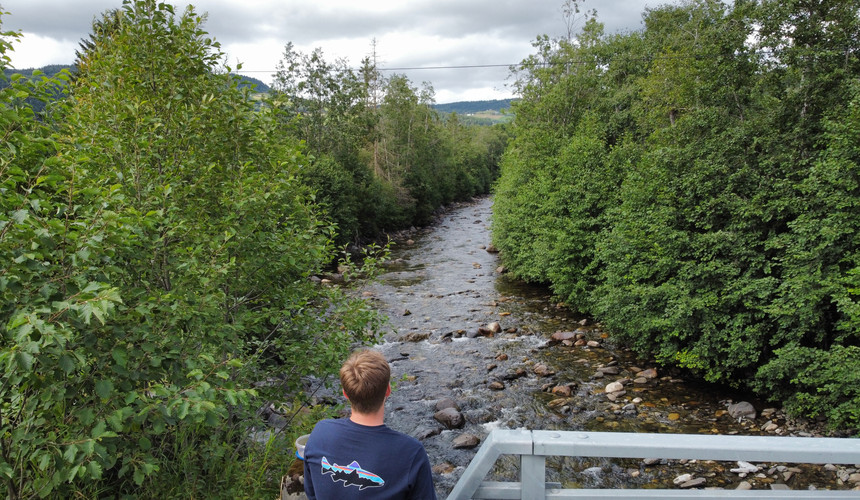Velkommen til SABICAS-teamet
- Sep 9, 2022
- 3 min read
Denne sommeren har studentpraktikantene på feltarbeid gjort en flott innsats for prosjektet. I tillegg er phd-student Mathias allerede godt i gang med sitt arbeid i SABICAS.

(english below)
Vår nye phd-student Mathias Brink Kjeldgaard skal forske på effektene av naturbaserte løsninger, blant annet kantvegetasjon og våtmarker i både Haldenvassdraget og Gausa.
Han har en mastergrad i biologi fra Københavns Universitet, og har tidligere studert effekten av menneskelige aktiviteter på fiskearter og næringsnett i Myanmar i samarbeid med NIVA.
I tillegg har flinke masterstudenter bidratt på SABICAS-feltarbeid i sommer.
Marie Mohr fra Münster i Tyskland tar masterstudier i landskapsøkologi. Som praktikant hos NIVA og i SABICAS-prosjektet denne sommeren har hun jobbet sammen med Mathias og el-fisket i de to case-vassdragene. Hun har også samlet og identifisert ulike typer edderkopper og biller langs elvekantene. For disse artene er kantsoner et viktig leveområde.
Les mer om hva de har jobbet med:
Florian Wester tar masterstudier i geografi ved Universitetet i Bonn i Tyskland. Som praktikant har han jobbet med å ta dronebilder av de to case-områdene og lage oversiktskart og modeller. Ved hjelp av dette arbeidet kan vi analysere de ulike typene kantsoner langs vassdragene, bl.a. ved å sammenligne bredde, lengde, høyde og vegetasjon.
Les mer om de tre (på engelsk) nedenfor.
Her er noe av det Florian har jobbet med i sommer (foto: Florian Wester).
Welcome to SABICAS!
This summer we have had great contributions in the field by master students in the project. Our new phd student Mathias has also started his work in SABICAS.
Mathias Brink Kjeldgaard, phd:
"I am a PhD student at NIVA working in the SABICAS project, where I will focus on the effect of nature-based solutions, like recovery of riparian vegetation and wet marks, in the catchments of Gausa and Halden.
My main scientific interests are freshwater ecology, biodiversity and food webs. Before moving to Oslo, I have been working as a student assistant in NIVA Denmark, and I did my master’s thesis in biology at the University of Copenhagen in collaboration with NIVA where I studied the effects of anthropogenic impacts on fish species composition and food webs in streams in Myanmar.
I am keen about this project, and I am excited to be take part of research focusing on sustainable solutions that will benefit biodiversity and important habitat types as well as human wellbeing".
Marie Mohr, master student:
"I am Marie Mohr from Münster (Germany) where I am doing my masters in Landscape Ecology. In my bachelor's I studied Biology and Geography.
I love to learn about nature and due to the complexity of nature's processes there is always more to learn. I am thankful for the opportunity to do an internship at NIVA because I really wanted to get more knowledge about freshwater ecosystems. I enjoy getting more experience while working together with experts from NIVA.
Besides helping Mathias with the Electro fishing I also have the opportunity to add my own topic to the project: I have a look on the terrestrial inverts (spiders and ground beetles). I want to analyse the effects of different riparian buffer zones on their biodiversity. Riparian zones, as an ecotone, have a important role connecting the terrestrial to the aquatic system.
Marie has contributed to investigating biodiversity and collecting species in both case catchments.
For terrestrial inverts the riparian zones are a important habitat and they are connected on the trophic level to the streams. I use pitfalltraps to catch the spiders and ground beetles. Afterwards I will sort und identify them.
I already look forward to compare the results. I am really interested in the nature-based solutions and I am optimistic that there are ways how we can design a better future for us and the nature."
Florian Wester, master student:
"My name is Florian Wester and I´m studying a M.Sc. Geography with focus on water in global change. My passion for rivers developed throughout my whole life - running water and the processes within and around it fascinate me.
I finished my B.Sc. in landscape ecology with a thesis on the development of a methodology for deriving flow velocities and flow paths using drone technology in rivers. Since then I am amazed by the opportunities and the perspective that drones provide for water research.
Within my internship at the SABICAS project I focus on collecting drone imagery of the study sites to create high resolution aerial maps (2.5 cm/pixel) and digital surface models (5 cm/pixel). These products will be used to analyze riparian characteristics (e.g. width, length, height, vegetation density) of our study sites to contribute to the research of the SABICAS project.
I am happy to be here and enjoy having the responsibility for my own little project to help solving societal and environmental challenges in times of global change.“



























